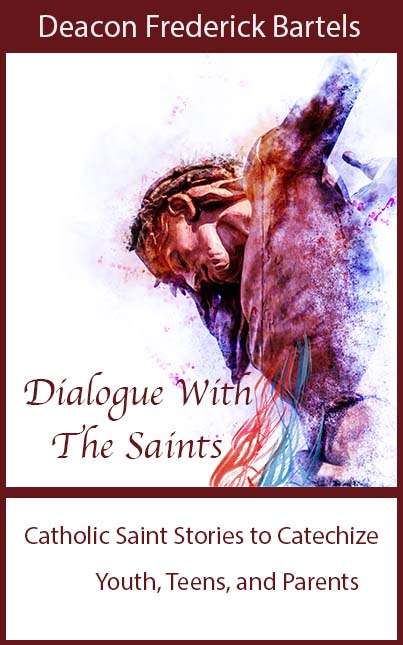
The day of the martyrs’ victory dawned. Saints Perpetua and Felicity marched from their cells into the amphitheater, as if into heaven, with cheerful looks and graceful bearing. If they trembled it was for joy and not for fear.
By Deacon Frederick Bartels
7 March 2012
Fortitude enables one “to conquer fear, even fear of death, and to face trials and persecutions. It disposes one even to renounce and sacrifice his life in defense of a just cause” (CCC 1808). Yet the gifts of the Holy Spirit elevate us further, giving us the power and ability required in order to readily sacrifice our life as a gift of self to Christ. In response to this immense and incomparable grace, we live in a new way and in a new manner, freely giving of ourselves in order that we may be re-created into a state of perfection by God himself.
There is a most beautiful account of Sts. Perpetua and Felicity’s deaths by martyrdom extant in The Story of the Death of the Holy Martyrs of Carthage, of which an excerpt is found in the Liturgy of The Hours for the Lenten Season (see also New Advent). It begins with these sublime words:
The day of the martyrs’ victory dawned. They marched from their cells into the amphitheater, as if into heaven, with cheerful looks and graceful bearing. If they trembled it was for joy and not for fear.“
Here we immediately get a sense of a moment in time in which two of God’s precious children, infused by supernatural grace and burning with charity, met with astounding courage and fortitude circumstances that would normally strike paralyzing terror into the hearts of men. Rather than fear, these saints were filled with joy; in contrast to hesitation and the instinct to flee in the face of death, they marched forward in eager anticipation of an approaching, violent demise.
What does it mean to be a saint?
Imprisoned and sentenced to death by wild beasts at Carthage during the persecution of Septimus Severus, Sts. Perpetua and her servant Felicity, along with three of their companions, perhaps endured their greatest torments in the days preceding their martyrdom. It is impossible to comprehend what it would be like to await such a death. There could be no escape for the victims; their long days of imprisonment in dark and dank quarters were surely filled with horrifying thoughts and images of what lie before them: the devastating claws and teeth of bears and leopards; the angry snorts of boars, and the deadly horns of wild cows.
Perpetua was a young mother who had recently given birth to a son. The dark cell forced upon her as her uncomfortable residence, combined with the savagery of the prison guards, must have thrown her into misery. Further, who can imagine the indescribable pain inflicted upon a mother’s heart at the thought of leaving her young child behind? Also, Felicity was pregnant at the time, and gave birth to her daughter—later adopted by a Christian woman—only two days prior to her martyrdom.
These courageous women and their three companions were sentenced to suffer unimaginable deaths because they refused to apostatize: they would not trade the Christian faith and the promise of an eternal life immersed in Love Itself for the pagan practice of sacrificing to the gods.
Rather than forgo that incomparable Beauty and boundless Love we call God, Perpetua, Felicity and the others marched with certainty of faith and hope into the arena as if into heaven itself.
Perpetua was the first to be thrown down, . . . She got up and, seeing that Felicity was prostrate, went over and reached out her hand to her and lifted her up. . . .” (1)
Ordered to the gate called Sanavivaria, Perpetua was welcomed there “by a catechumen named Rusticus. Rousing herself as if from sleep (so deeply had she been in spiritual ecstasy), she began to look around. To everyone’s amazement she said: ‘When are we going to be led to the beast?’ When she heard that it had already happened she did not at first believe it until she saw the marks of violence on her body and her clothing.”
Having survived the wild beasts, the onlookers demanded that the saints be led to the middle of the amphitheater, where they would be slain by the sword. Perpetua had to be helped along the way due to her broken body. After the kiss of peace, Perpetua, “that she might experience the pain more deeply, . . . guided the shaking hand of the inexperienced gladiator to her throat. Such a woman—one before whom the unclean spirit trembled—could not perhaps have been killed, had she herself not willed it.”
Infused Grace: Supernatural Gifts Which Elevate and Perfect Human Nature
We might ask, how could anyone endure such horror with such joy? We might find within ourselves the natural ability to suffer for some desired concrete reward. But would we do so joyfully? That is doubtful. Further, while most of us would find the strength to die in order to save our own child, is it within our human power the ability to die for something invisible, something promised by faith that we have neither seen nor heard? Is it within our natural human power to offer our life with joy in order to obtain an abstract good?
What gives to us the power—what adds to what is naturally possible for the human person—necessary to face our own death with great courage and determination as did Sts. Perpetua and Felicity for the love of Christ? In order to accomplish such a feat, we need something that will elevate our human nature and therefore enable us to achieve that which was formerly beyond our capability. Obviously, we are speaking about something we cannot acquire for ourselves; thus it must be a free gift. And since it is not natural to us, it is by definition a supernatural gift: a gift from God. It is only with such a gift that we can possess the power to confidently withstand the extreme tension involved in the type of deaths these martyrs endured with joy.
Here we arrive at the gifts of the Holy Spirit (see CCC 1831). First received in the sacrament of Baptism and later strengthened by the sacrament of Confirmation, the gifts of the Holy Spirit elevate and perfect the acquired and infused cardinal virtues (see CCC Article 7); in fact, elevate our nature in such a way as to give us a share in actions proper only to God. In virtue of these gifts, Perpetua and Felicity were aided supernaturally as they shared in God’s own divine life. Therefore they embraced the cow’s horns with a fortitude that was beyond strictly human power.
But even before we can speak of the gifts of the Holy Spirit, we first must speak of the theological virtues of faith, hope and love, in which all human virtues are rooted (CCC 1812), and which are themselves gifts. It is by faith that Perpetua and Felicity believed in God and all that he has said and revealed through the Church; it is by hope that they desired heaven and eternal life as their happiness, and trusted in Christ’s promises and his power to see them safely along their journey to its sublime end; and it is by charity that they were given the ability to love God “above all things for his own sake, and our neighbor as ourselves for the love of God” (see CCC 1814 ff.).
Empowered by Love to Live in New Ways: Right Here, Right Now
Perpetua and Felicity’s wondrous story of martyrdom, in which we learn of the inexpressible beauty of the supreme gift of self to Christ, remains meaningful and relevant for us today. How so? While we may not be required to shed our blood upon the tips of a cow’s horns, nor find it fitting to guide the executioner’s sword to our throats, we nevertheless are called to a type of martyrdom in which we freely give of our life in order to defend the teaching of our Savior, living according to his law of love as true disciples.
Further, the true disciple defends and upholds with charity and tenderness the teaching of holy mother Church unceasingly, whether at home or at work or at social gatherings or in the public square, for she is Christ’s Bride whose life was gained at the cost of our Savior’s sacrificial death on the Roman cross. It is through the Church, the sacrament of salvation, in which we receive the sacraments of life and the words of truth so crucial to living a fully human life.
It is unnecessary to list the many and varied elements, perhaps inspired diabolically by the Father of Lies, of today’s society which undermine the very foundation of what we believe and know to be true as Christians. It is enough to say that the threatening “wild cow” of the present, whose horns are indeed set to impale us, is the anti-gospel of which Blessed John Paul II warned.
Let us beg for an increase in the gifts of the Holy Spirit and then rely on them in hope; let us live according to the Spirit’s tender and compassionate love; and let us forever keep our eyes fixed on Christ and the wondrous salvific plans of the Father. Then, let us go forth empowered by grace to act in ways proper only to God, that we may live and die as Christians. Let us follow in the example of Perpetua and Felicity.
“Blessed are they who are persecuted for the sake of righteousness, for theirs is the kingdom of heaven” (Mt 5:10).
- quotes on the martyrdom of the saints taken from the account found in the Liturgy of the Hours.

Deacon Frederick Bartels is a member of the Catholic clergy who serves the Church in the diocese of Pueblo. He holds an MA in Theology and Educational Ministry, and is a Catholic educator, public speaker, and evangelist who strives to infuse culture with the saving principles of the gospel. For more, visit YouTube, iTunes and Twitter.





Leave a Reply